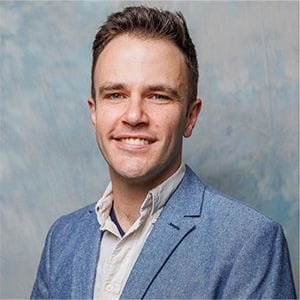In this interview, Dr. Cripwell discusses his group’s latest work in the field of thermodynamic modeling and the impact of open access in disseminating research in the global South.

As part of an ongoing series here on ACS Axial, we’re interviewing authors and librarians from around the world to find out more about their research, their published work, and the impact that open science is having on a changing landscape of research communication. This time, we're speaking with Dr. Jamie Cripwell, Senior Lecturer at the Department of Chemical Engineering, Stellenbosch University, South Africa.
If we want scientists worldwide to be on a level playing field, then we all need to have access to the same materials.

Good afternoon, Dr. Cripwell. Could you tell us about your research group's current focus?
Our focus is predictive thermodynamic modeling. We like to say that we work at the interface between the measurement of the data and the modeling thereof, because those fields are distinct at times. We look at the kind of data that's needed to make thermodynamic models better and then try and measure that data ourselves.
Could you describe the work covered in your recent publication, for someone who isn't familiar with the area?
So in this particular work, we're looking at using a group contribution thermodynamic model. You can think of it as defining a model like LEGO® blocks, building it up from constituent pieces and then using it predictively. In that particular context, we were looking at the possibility of using nonaqueous cosolvents in carbon capture and storage (CCS). A lot of the conventional CCS technology uses aqueous amine solutions. There's been a drive to explore organic cosolvents, because that has a lot of benefits on heat duties, among other operational aspects. But unfortunately, as with a lot of these things, the data are limited and so correlative modelling has limited value. We're asking the question of how accurate can we be with these predictive models? This is one of a series of papers where we're building the capacity up to get the predictive model to a point where we can assess the predictive performance in these complex systems.
How was the experience of publishing in Industrial & Engineering Chemistry Research?
We always try to publish in journals like I&EC Research because it's one of the most reputable journals within the field of applied thermodynamics. I&EC Research is one of the places where the big names in our field aim to disseminate and read work. The experience itself was really quite smooth—it typically is with ACS journals and we appreciate it, which is why we keep choosing it to submit to.
What kind of impact do you think your research has had since its publication?
I think it's a challenge for us down in South Africa, because there's sometimes a little bit of skepticism of work that comes out of the global South. But we're fortunate to have good ties with a couple of other research groups in in Europe that that know what we do. So far there's been quite positive feedback with peers telling us that the idea is intriguing.
We try to be as open as possible and not over-promise with the work, and we're being very frank with what the models show that this approach is capable of doing. I think people are excited about the prospect and seeing what might be possible, given limited data.
The article was published OA under your institution's read and publish agreement with ACS—how did you discover this was available?
It was communicated quite widely within our university. Again, coming back to the idea of being in the global South, one massive benefit we have from these kinds of agreements is that we can make this kind of work open access without having to pay for it personally. That's a huge benefit for us, as it increases the readership. I think we just really wouldn't be able to afford open access otherwise.
What are your thoughts on open access?
I think the idea is great. My institution is fortunate in that we generally have access to most paid subscriptions. But that's not generally the case, especially in South Africa, or I suppose the global South in general, those costs can be fairly prohibitive, so institutions have to be quite selective with what they get access to. We rely quite heavily on interlibrary loans otherwise, so the idea of open access—instant and barrier-free reading— is really important. It means that we're not "prohibited" from engaging with important work just because of the subscription fee. If we want scientists worldwide to be on a level playing field, then we all need to have access to the same materials.
What are your thoughts on open science workflows (e.g. open methods, preprints, transparent peer review, open data) more generally?
So I think, especially within our field of thermodynamic modeling and applied thermodynamics, historically there's been a culture of research groups pouring so many hours into getting code up to a level where they can reproduce others' work, so there's always been a kind of hesitation to provide access to data beyond tabulated results.
It took us quite a while to build that capacity for ourselves, and then be able to reproduce other people's work to verify their findings—so personally, I'm a big advocate for platforms like Github, for code sharing, and for open access to articles and data in general to increase transparency. We've found a couple of times, actually, that because of those closed-door attitudes to data sharing you just find you're butting your head against the wall if you try to replicate, and then you find out it's due to something silly like the data in the paper had a decimal place in the wrong spot. That's incredibly frustrating, because that's just a reporting issue. So I'm definitely very much on board for open science and transparency, but I suppose at the same time I can appreciate why there was that that hesitation in the beginning, having invested heavily in both time and resources to build your own group’s capacity, only to “give it away.”
What do you think are the biggest recent developments in open science and open access?
Something that I've only recently become more familiar with as we broaden our scope is the idea of preprints, things like arXiv and getting your work out there before someone else does something unethical with it during the review process. I've never personally been subject to such kinds of behaviors, but I do know people who have. In the modeling and coding spheres, there's definitely been a stronger push towards exactly that kind of thing—simultaneously uploading your documents onto a preprint server when you're submitting to a publisher.
I mentioned earlier the whole idea of Github repos, and that's something I see a lot more now. I've also noticed that journals include data review in their peer review processes, and you're getting these cycles of, you know, "thank you for submitting your review comments, we'll keep you in the loop because the authors are fixing their Github repos." So there has been a noticeable change in the past couple of years, but it's an important one because even with open source and open access, it doesn't mean the work is going to be obviously reproducible.
Where do you see OA in 10 years' time?
That's an interesting one, just because of the rapidity with things which things are changing at the moment. I think that, philosophically, open access must be the way to go. If we're going to talk about making an equal playing field and the globalization of research, I think that open access has to be the approach.
I also think, though, that sustainability is always going to be difficult. Recently there have been calls for paid peer review, and similar ideas floating around which would surely increase the costs in the process.
My guess would be that that open access would be the standard in 10 years' time, but the most interesting question will be who pays for it. This is definitely going to be an interesting period.
What do you think you'd be doing if you weren't a researcher?
Growing up, I wanted to be a teacher—so now that I've ended up in academia, I suppose it's just, you know, "big school"? [Laughs]
That's probably what I would be doing otherwise—working in secondary education, although these days that has its own challenges. But I love the whole pursuit of knowledge, and interacting with people who have something to gain from just talking to you. I've always found that aspect of academia, and teaching too I guess, to be really insightful, valuable, and deeply rewarding.
Check out the other interviews in this series:
Ian Cousins, Stockholm University
Hongxia Duan, TU Eindhoven
Vojtěch Vaněček, Institute of Physics, Czech Academy of Sciences
Louise Otting, TU Delft
Kristine Horvat, University of New Haven
David W. McCamant, University of Rochester
Fernando Sartillo Piscil, Benemérita Universidad Autónoma de Puebla
Lillian Chong, University of Pittsburgh
Sue Cardinal, University of Rochester
Rubén Mendoza-Cruz, Universidad Nacional Autónoma de México
Alison Bradley, Partnership for Academic Library Collaboration and Innovation
Vesna Srot, Max Planck Institute for Solid State Research
Matt McDowell, Georgia Institute of Technology